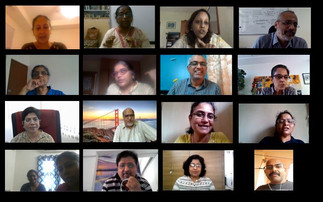Update from SAN India – Summer 2021
- info6721880
- Aug 13, 2021
- 2 min read
The year 2020 has been a year of introspection, innovation and inspiration for us at SAN, India. Introspection led us to innovate new courses and programs, which inspired both the SAN India team and the program recipients to move forward during the pandemic days. Our training focus shifted from grooming Social Auditors to Social Impact Practitioners. Thus, was launched A 3-day Social Impact Practitioner training– a new virtual training program. 6 Social Auditors from SAN India were the resource persons for this training.
Introspection
SAN India has conducted over 20 SAA master classes over the last five years, which were attended by over 300 participants. Also, 20 social auditors have been certified.
The prerequisites to become a Social Auditor at SAN India are:
1. Attending the SAA master class
2. Observing a social audit panel
3. Participating in a social audit panel
4. Drafting Social accounts for an organisation that would be certified by SAN India
5. Chairing a Social Audit which will be mentored by a SAN India certified Social Auditor
While SAA Master Class participants were enthusiastic about the first three steps, they were not forthcoming in drafting social accounts. This step has been made mandatory at SAN India as we wanted participants to thoroughly understand the social accounting and audit process before they get qualified.
India is home to over 3 million NGOs and social enterprises, and SAN India is morally inclined to groom ethical social auditors who would be non-judgmental in their approach and enable the clients to benefit from the social audit exercise by improving their programmes, strategies, and impact rather than making it as a glamourous report for the sake of their funders/donors.
This led us to conceive a programme that would not be as rigorous as a Master Class, but one that would allow participants to focus more on social impact and engage in drafting simple social impact reports. The content for the Social Impact Practitioner Training majorly covered the social accounting and audit principles with a few additions like SDGs and Theory of Change. Different reporting formats with specific focus on Relevance, Effectiveness, Efficiency, Sustainability, Technological usage, etc. of the projects are also discussed.
SAN India conducted three training sessions in which 38 participants enrolled. 15 participants have written Social Impact Assessment reports and have been awarded with a Social Impact Practitioner certificate.
As travel became a huge challenge during the COVID pandemic, we decided to hold virtual Social Audit panels. Having prior experience in mentoring 2 social auditors at Dubai, where online panel meetings were organized with two panelists attending virtually from India and the rest from Dubai, we embarked on a total virtual panel.
Conducting the social audit trail was a challenge, but we managed it well with use of technology. For the last audit, the Social Auditor for from Bangalore, and the other panel members along with the NGO staff were from Chennai. A virtual trail was held via zoom and the Social Auditor reviewed the documents and reports online. The panel members were very impressive, and this meeting went for over 4 hours.
SAN India conducted three online Social Audits last year and our team has written 10 social impact reports where most of the stakeholder consultations were coordinated virtually.






Comments